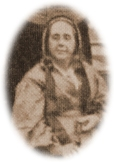

Abigail Hopper Gibbons was an abolitionist, prison reformer, Civil War nurse, and welfare activist. She was born on December 7, 1801 in Philadelphia, Pennsylvania. Her parents, Isaac Tatem and Sarah Tatum Hopper, both came from old Quaker families, and sent their ten children to Friends' schools. The Hoppers' home life revolved around religious devotion and community service. Sarah Hopper became a Quaker minister, while Isaac Hopper spent a considerable amount of time, and what little money he had, helping runaway slaves.
Abigail helped her parents make ends meet by selling tea with her mother, and by founding a Quaker day school in 1821, which she ran for almost ten years. In 1822, Sarah Hopper died. Her husband remarried and moved to New York City with his new wife and younger children in 1829. In 1830, Abigail joined them, and found a job in a Friends' school.
She married James Sloan Gibbons, a Philadelphia Quaker, on February 14, 1833. He sold dry goods and later became a banker. The couple had six children: William, Sarah Hopper, Julia, Lucy, Isaac, and James.
James Gibbons shared the Hoppers' commitment to abolition and other reforms, and his success in business enabled his wife to pursue her interest in charitable work. Together they became active in the Manhattan Anti-Slavery Society. In 1841, Abigail Gibbons's husband and father were disowned by the New York Monthly Meeting of Friends-Hicksite Branch. The organization, which had come under conservative control, opposed their abolitionist activities. Abigail Gibbons resigned from the society a year later, when the decision was confirmed by the Yearly Meeting. She never formally forgave the Quakers.
Gibbons' interests as a social activist were broad: she became involved in the temperance movement, she opposed capital punishment, and she helped impoverished people. Although she was never formally involved in the struggle for women's rights, she criticized inequities between men and women, and worried about how cloistered women's lives were. In 1845, she became a leader in the Female Department of the Prison Association of New York, an organization founded by her father to rehabilitate convicts. The next year, she was elected to a women's committee which oversaw "The Home," a shelter for women who had just been released from prison. The name of this institution later became the Isaac T. Hopper Home, in honor of her father. In 1853, the Female Department became a separate society, the Women's Prison Association and Home, and Gibbons was involved for years in its management.
Gibbon's eldest son died while attending Harvard College. To manage her grief, she increased her charitable activities by working in the tenement districts, the Randall's Island infant asylum, and the city's largest jail, which was known as the Tombs. She also assumed the presidency of the German Industrial School for poor children of German descent. In response to the Civil War, she became a nurse, and advocated on behalf of Black "contrabands." She became a controversial figure when she began criticizing hospital managers and army surgeons.
After the Civil War, Gibbons founded the Labor and Aid Society for returning soldiers, and the New York Diet Kitchen Association in 1873. She also served as head of the New York Committee for the Prevention of State Regulation of Vice, and lobbied for a measure which would require the state to employ police matrons.
Gibbons felt that the highlight of her life came in 1892, with the passage of legislation to establish a women's reformatory in New York City. Her last public appearance was made in support of this measure. She died of pneumonia on January 16, 1893 at the age of 91.
